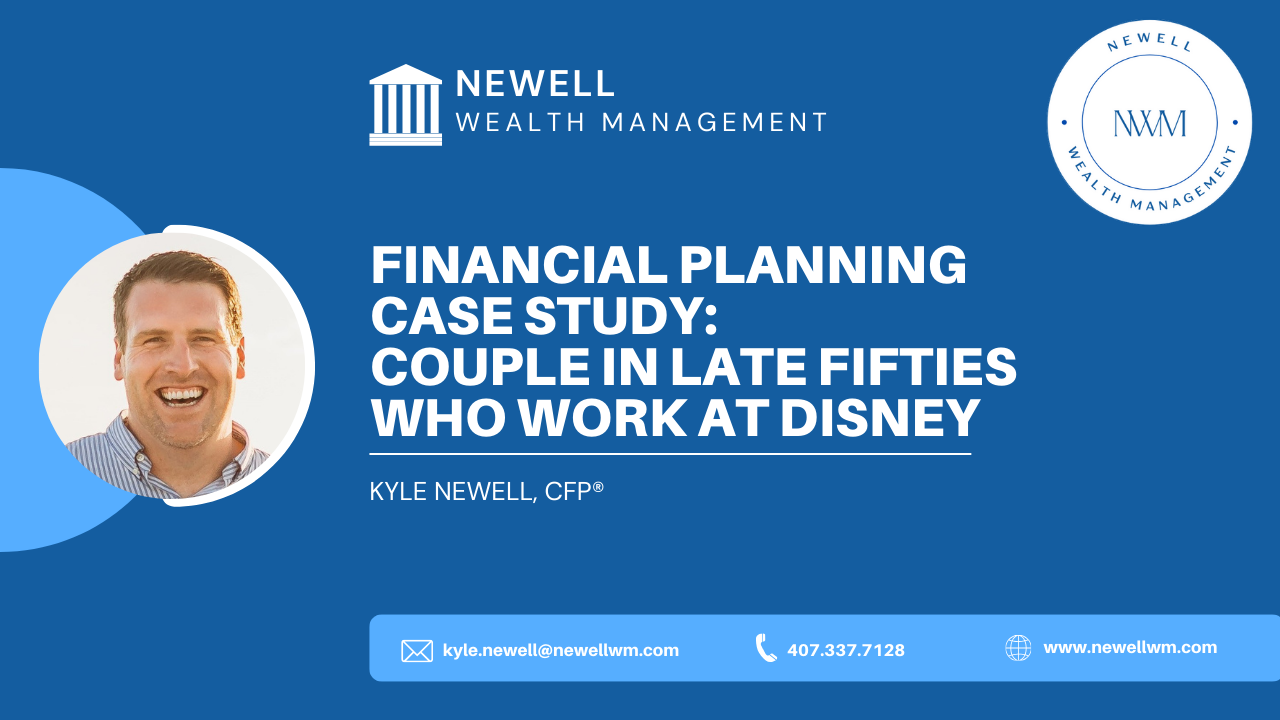Strategy Case Study: Couple in Late Fifties Who Work at Disney

I recently met with a couple in their late 50s who are getting closer to retirement. Their main concern was having the right strategy for their retirement plans. He’s an executive at Disney, and his wife works as a nurse, so they are both making pretty good money.
Generally, in your late 50s, you’re making the best money of your career. Given their professions, this couple is also very busy. They’re more than capable of handling their financial situation, but at the same time, there’s only so much time in the day.

I recently worked with them on some changes to help them save a substantial amount on taxes and gain clarity on their finances as they prepare to move from their working years into retirement. To do this, we focused on four key areas.
1) Investment Strategy
Investments are a significant part of transitioning from working years into retirement because it’s a changing strategy. At one time, the strategy was all about growing. Now, in your late 50s, that strategy has helped you build a nice nest egg.
It now becomes less about growing and more about protecting and preserving. You still want your money to grow but don’t necessarily want to take the same risks that you did in your 20s or 30s.
Changing strategy is important. We grow more assets in more different pockets of money as we age. By the time you reach the late 50s, you may have
- Stock accounts
- Mutual funds
- Annuities
- Bank Accounts
- Savings Accounts
It can be complex when managing the strategy on several different accounts. You need to know the answers to a few questions.
- What’s your overarching investment strategy?
- What are the tax ramifications associated with each type of account?
- How do you coordinate them together?
One of the essential strategies for this couple was to reduce the amount of risk they have by reducing the stock allocation overall. We also needed to do that in a tax-efficient manner. More conservative investments, like bonds, for example, pay interest that’s considered ordinary income interest.
Rather than holding that in a taxable account, we wanted to have it in a non-taxable account to keep their growth-oriented investments in non-retirement accounts with a bit more tax efficiency.
2) Stock Compensation Plan
The next thing we looked at was their stock compensation plan. Disney’s main stock compensation plan is called long-term incentive or Disney LTI. It’s the “golden handcuffs,” as they say.
This compensation is given in one year but vests over a three-year timeframe. In 2023, it pays out in June and December. Income is not paid out in cash but with Disney stock. The question becomes, “How do we handle that Disney stock.” Not only the amounts that have already accumulated over time but also ongoing contributions.
My first thought when talking to clients about investments is if we believe this is a prudent investment moving forward based on the goals and objectives that each person is trying to accomplish. Some will say yes. Others will say no. Much of it concerns the overall allocation and how much exposure they might have to the company’s stock.
Generally, I don’t advise people to have more than 10% of their net worth tied up in company stock, which can be exasperated. This is especially true if their ordinary income is also coming from the company.
For this couple, we needed to decide how to handle the ongoing payout of the Disney LTI and, simultaneously, what to do with the existing business stock. The foundation of our strategy included
- Looking at their goals and objectives.
- Researching the investment and what each person thought about it.
- Determining the tax ramifications.
This client, in particular, has held Disney stock for many years. They’ve had some gains and losses, so changes can be made with low tax ramifications. It’s essential to consider tax ramifications in every individual situation.
3) Bonus Compensation
Thirdly, we looked at their bonus compensation. They also receive bonus compensation in lump sum payments on top of LTI. This compensation means they now have extra income above what they need. They don’t want to spend it so we needed a place to put that money.
To house the extra money, we looked at using what’s called a non-retirement account or after-tax account. These are investment accounts where they can buy into stocks, bonds, mutual funds, etc. It can be held as a joint account rather than an individual to pass it to one another or add another beneficiary in case something happens to both of them.
Doing this allows us to have an investment strategy in that non-retirement account that can build up and help cushion the transition to retirement, especially if we’re planning to potentially delay Social Security or pension income. If they want an early retirement, we need to find a way to cover healthcare or other potential expenses.
We only want to do this assuming all the tax-advantaged accounts are already being funded through other means like your 401k, Health Savings Account, or similar account types.
4) Estate Planning
Now that the kids are grown and starting their own lives, it’s time to update their estate planning. We primarily focused on what happens if they pass away or are incapacitated and who will make the decisions.
Estate planning is more involved than just having the proper documents in place. Documents are the obvious first step, and many people have this part taken care of.
It’s the second part that is often overlooked. Talking through the plans and wishes. I suggest not just talking through it but having plans written down. Include things like
- How to access accounts, including passwords
- Who the points of contact are
- Where to find the documents
Sometimes, clients have done these two things but have yet to implement the documents onto their accounts. It may be renaming beneficiaries, changing account titles, or updating it with the account holder.
Don’t Wait to Plan
Checking your investment strategy regularly is always recommended. Even more so at this stage of life. Considering the tax ramifications of how you will receive your money can make a difference in your retirement life. How you plan your estate and communicate it makes it easier on you and your loved ones should something happen.
You may not be quite ready to retire, but preparing in advance is essential. If you’re in your late 50s and looking to start making the transition to retirement, following the suggestions in this case study is a great start.
Important Information
Newell Wealth Management, LLC (“NWM”) is a registered investment advisor offering advisory services in the State of FL and in other jurisdictions where exempted. Registration does not imply a certain level of skill or training. The presence of this website on the Internet shall not be directly or indirectly interpreted as a solicitation of investment advisory services to persons of another jurisdiction unless otherwise permitted by statute. Follow-up or individualized responses to consumers in a particular state by NWM in the rendering of personalized investment advice for compensation shall not be made without our first complying with jurisdiction requirements or pursuant an applicable state exemption.
All written content on this site is for information purposes only and is not intended to provide specific advice or recommendations for any individual. Opinions expressed herein are solely those of NWM, unless otherwise specifically cited. Kyle Newell and NWM are neither an attorney nor an accountant, and no portion of this website content should be interpreted as legal, accounting or tax advice. Material presented is believed to be from reliable sources and no representations are made by our firm as to other parties’ informational accuracy or completeness. There is no assurance that the views or strategies discussed are suitable for all investors or will yield positive outcomes. Investment involves risks including possible loss of principal and unless otherwise stated, are not guaranteed. Any economic forecasts set forth may not develop as predicted and are subject to change. All information or ideas provided should be discussed in detail with an advisor, accountant or legal counsel prior to implementation.
